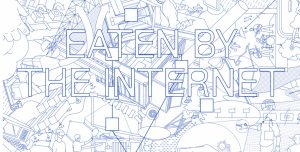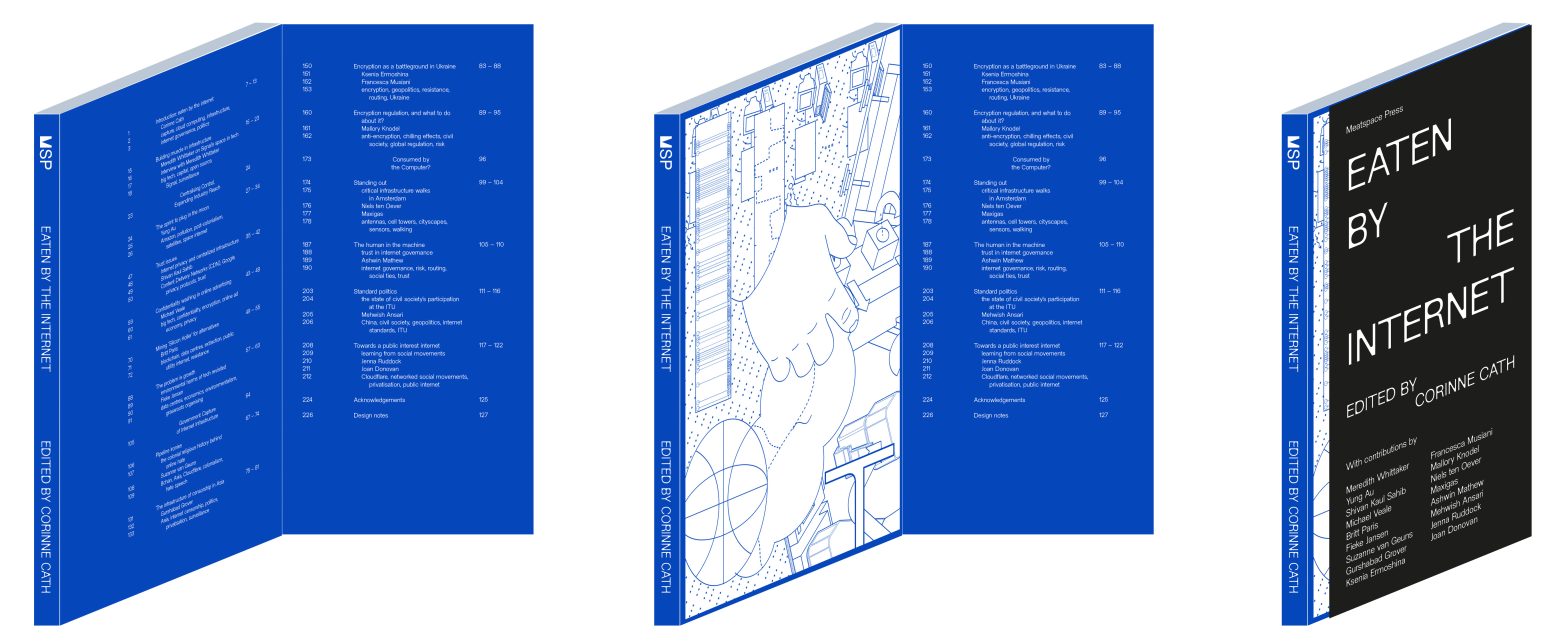
Download the pdf of the book here: https://shop.meatspacepress.com/products/eaten-by-the-internet-digital-download-ebook-and-pdf
Eaten by the Internet: Power and the Future of the Digital Society, edited by Corinne Cath, published by Meatspace Press, online, 2023.
Our world is eaten by the Internet. This means that those who control the Internet control the bounds of public speech, economic production, social cohesion, and politics, making its infrastructure a core political terrain in the networked age. This evening we honor a new book about the power of Big Tech and the future of the digital society, Eaten by the Internet. The discussion with the book’s authors and editor will make Internet infrastructure visible as a key force of political power and urge us to ask how can we ensure the Internet will sustain us, rather than consume us.
To understand power in the contemporary Internet industry, we must look closely at its often invisible infrastructure. This is made of material components such as cell antennas, clouds, chips, data servers, and satellites, but also less tangible, equally crucial standards and software components, including the operating systems, browsers, and computing power that enables connectivity. All these components rarely attract our attention unless something breaks down. And even then, many Internet users won’t ask why.
Eaten by the Internet makes Internet infrastructure visible as a force of political power, demonstrating how it is transforming the social world. Four of the original contributors of the book will be present to discuss their chapters, taking on thorny topics, such as power consolidation in the advertisement and cloud industry, online censorship in Asia, the role of Internet infrastructure in governmental and corporate surveillance in the city of Amsterdam, and tech’s environmental impact – amongst others. In doing so, this event will root contemporary technology debates in the politics of digital infrastructure and help us design an Internet that answers to public values.
About the speakers
Corinne Cath is a post-doctoral researcher at the University of Delft funded by the Algosoc consortium, a fellow at the UvA’s critical infrastructure lab, and a research associate at the Minderoo Centre for Technology and Democracy at Cambridge.
Gurshabad Grover is a technologist and legal researcher based in Delhi, India. Gurshabad’s research focuses on network security, censorship, and surveillance.
Fieke Jansen is the co-founder of the critical infrastructure lab and a post-doctoral Researcher at the University of Amsterdam. She also coordinates the Green Screen climate justice and digital rights coalition.
Michael Veale is an Associate Professor in digital rights and regulation at University College London’s Faculty of Laws. His research focuses on understanding and addressing challenges of power and justice that digital technologies and their users create and exacerbate, in areas such as privacy-enhancing technologies and machine learning.
Niels ten Oever is an Assistant Professor of AI and European Democracies at the European Studies Department and co-founder of the critical infrastructure lab at the University of Amsterdam.
October 31, 2023, Spui 25, Amsterdam, 5.30-7.00pm
Register here: https://spui25.nl/programma/eaten-by-the-internet
More information on the website of UvA’s Critical Infrastructure Lab
—
More on the book:
Meatspace Press is excited to announce our sixth paperback publication Eaten by the Internet, edited by Corinne Cath.
This book makes internet infrastructure visible as a force of political power—through fifteen chapters contributed by a global set of researchers, activists, and techies. It roots contemporary technology debates in the politics of internet infrastructure and urges us to ask how can we ensure our infrastructures sustain us, rather than consume us?
We are living in a unique moment: internet technologies are the default infrastructure for society, not just how we communicate but also how we organise our social life, politics, and economy, all the way down to our material environments, like cities. Our world is eaten by the internet. This means that those who control the internet control the bounds of public speech, economic production, social cohesion, and politics, making its infrastructure a core political terrain in the networked age. The book’s chapters cover a wide set of topics, spanning from the global politics of content moderation by internet infrastructure to the colonialism inherent in the race to plug the moon, from the harms wrought by blockchain companies in rural America to the particularities of online censorship across Asia. The chapters take on thorny topics, discussing power consolidation in the advertisement and cloud industry, the role of internet infrastructure in the war in Ukraine, and tech’s environmental impact—amongst others. How can we ensure our internet infrastructure sustains us?
The book is available to buy in print and ebook formats from the Meatspace Press shop. Like all Meatspace Press publications, it is also open access and freely available to download in pdf format (see below).
Contributors: Mehwish Ansari, Yung Au, Corinne Cath, Joan Donovan, Ksenia Ermoshina, Suzanne van Geuns, Gurshabad Grover, Fieke Jansen, Mallory Knodel, Ashwin Mathew, Maxigas, Francesca Musiani, Niels ten Oever, Britt Paris, Jenna Ruddock, Shivan Kaul Sahib, Michael Veale, and Meredith Whittaker.

Design and illustration by Carlos Romo-Melgar and John Philip Sage.
You can buy a copy of the book (and support future Meatspace Press projects!) in our shop. This includes both paperback versions and a range of ebook formats available from the shop (epub, mobi, azw, etc). We also have discounts available for students and/or those on low incomes, as well as a range of offers and discounts on the Meatspace Press back catalogue.
The paperback edition comes with a FREE POSTER, featuring the book’s illustrations. Lucky customers will also receive FREE STICKERS!

Contents
- Introduction: eaten by the internet (Corinne Cath)
- Building muscle in infrastructure: Meredith Whittaker on Signal’s space in tech (Interview with Meredith Whittaker)
- The sprint to plug in the moon (Yung Au)
- Trust issues: internet privacy and centralised infrastructure (Shivan Kaul Sahib)
- Confidentiality washing in online advertising (Michael Veale)
- Mining ‘Silicon Holler’ for alternatives (Britt Paris)
- The problem is growth: environmental harms of tech revisited (Fieke Jansen)
- Pipeline ironies: the colonial religious history behind online hate (Suzanne van Geuns)
- The infrastructure of censorship in Asia (Gurshabad Grover)
- Encryption as a battleground in Ukraine (Ksenia Ermoshina & Francesca Musiani)
- Encryption regulation, and what to do about it? (Mallory Knodel)
- Standing out: critical infrastructure walks in Amsterdam (Niels ten Oever & Maxigas )
- The human in the machine: trust in internet governance (Ashwin Mathew )
- Standard politics: the state of civil society’s participation at the ITU (Mehwish Ansari)
- Towards a public interest internet: learning from social movements (Jenna Ruddock & Joan Donovan )
- Acknowledgements
Details:
Title: Eaten by the Internet
Edited by: Corinne Cath
Publisher: Meatspace Press (2023)
Place of publication: Manchester, United Kingdom
Weblink: meatspacepress.com
Design: Carlos Romo-Melgar and John Philip Sage.
Commissioning editors: Mark Graham and Joe Shaw
Managing editor: David Sutcliffe
Copy editor: Suzanne van Geuns
Format: Paperback and pdf
Length: 128 pages
Language: English
Product code: MSP231001
ISBN (paperback): 978-1-913824-04-4
ISBN (pdf, e-book): 978-1-913824-05-1
DOI: 10.58704/dmnx-1r61
License: Creative Commons BY-NC-SA
Open access:
We hope that you will support the project by buying a paperback copy or the digital download on our shop (which includes both a pdf version and a range of ebook formats). However, you may also download a pdf version (9mb) via Internet Archive.

